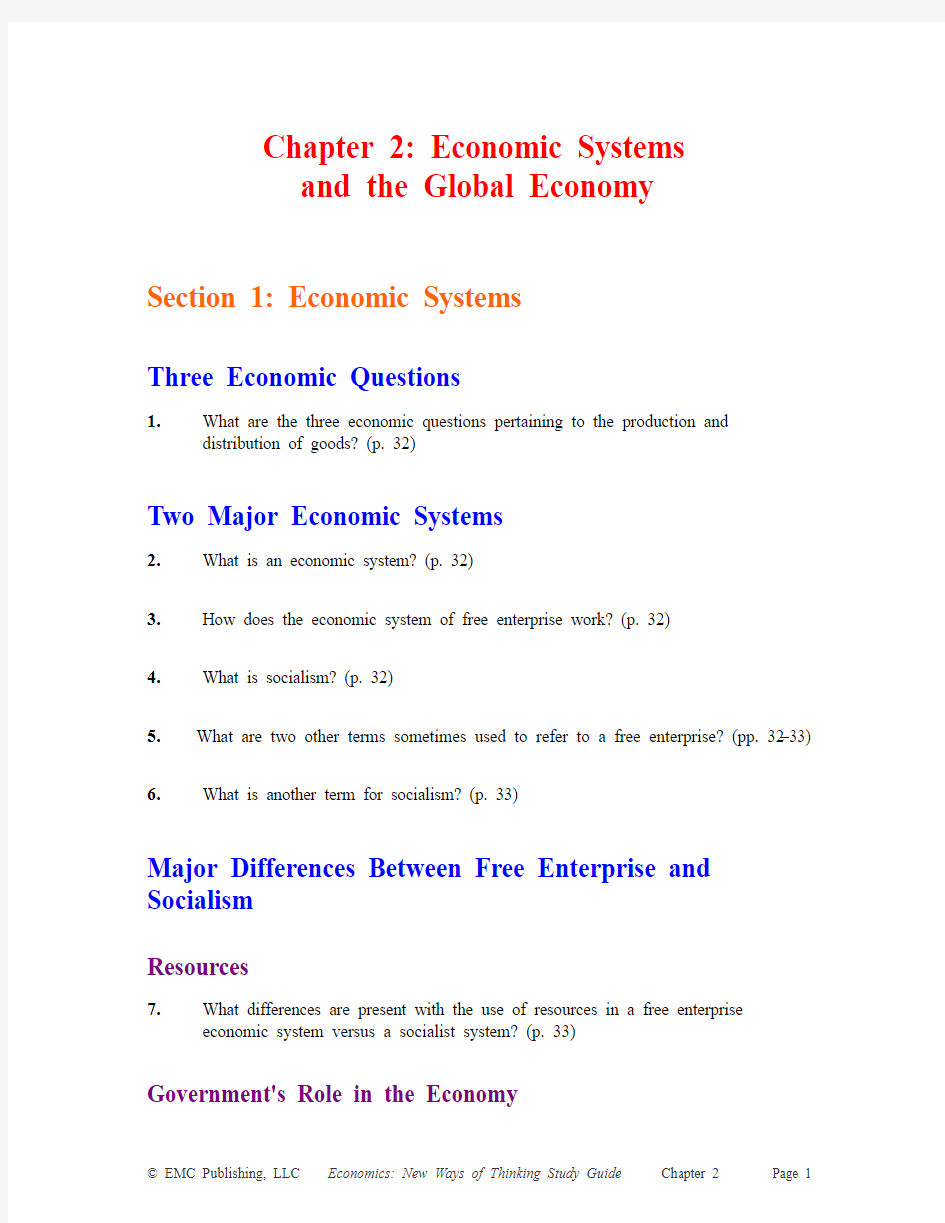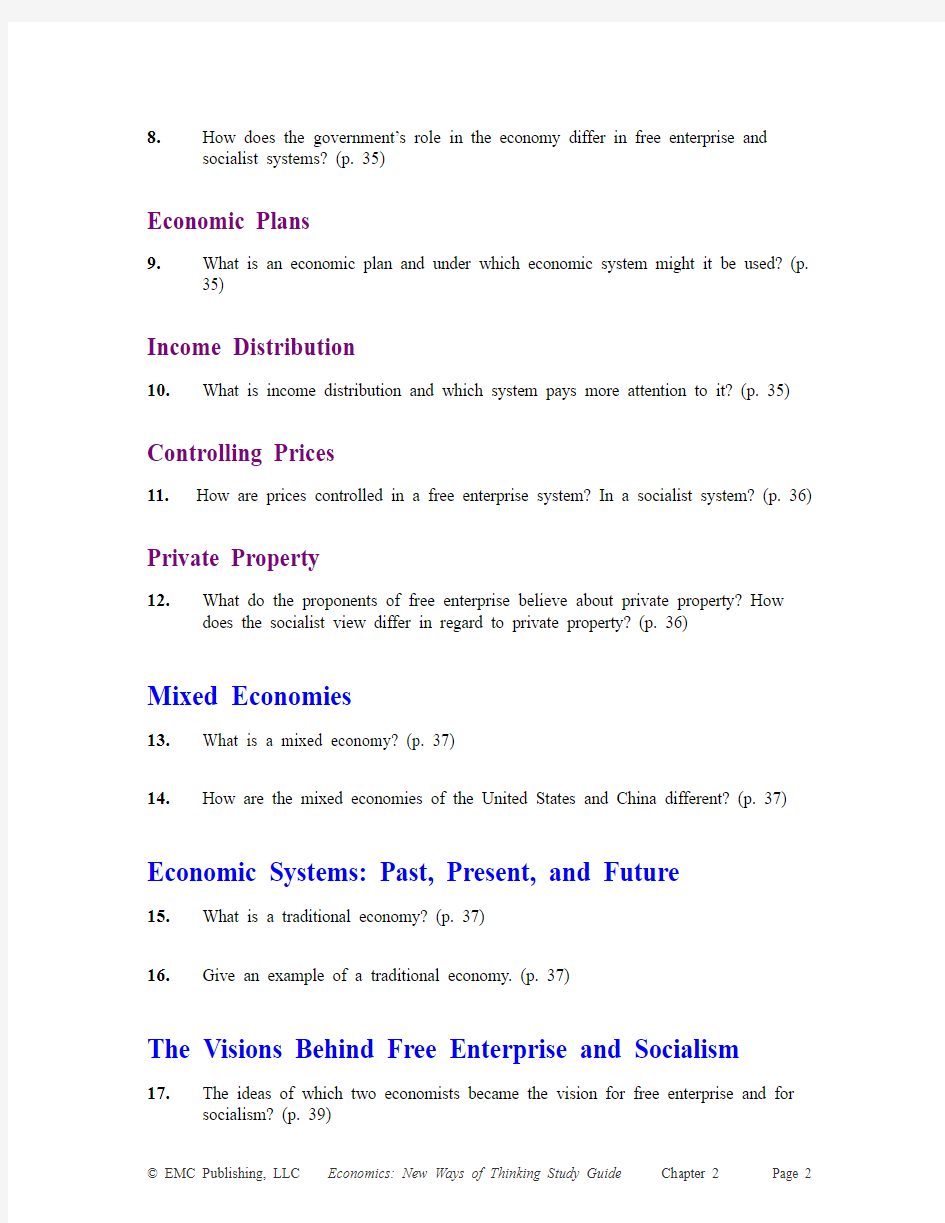Econ2011_Chapter2_StudyGuide


Chapter 2: Economic Systems
and the Global Economy
Section 1: Economic Systems
Three Economic Questions
1.What are the three economic questions pertaining to the production and
distribution of goods? (p. 32)
Two Major Economic Systems
2.What is an economic system? (p. 32)
3.How does the economic system of free enterprise work? (p. 32)
4.What is socialism? (p. 32)
5.What are two other terms sometimes used to refer to a free enterprise? (pp. 32–33)
6.What is another term for socialism? (p. 33)
Major Differences Between Free Enterprise and Socialism
Resources
7.What differences are present with the use of resources in a free enterprise
economic system versus a socialist system? (p. 33)
Government's Role in the Economy
8.How does the government’s role i n the economy differ in free enterprise and
socialist systems? (p. 35)
Economic Plans
9.What is an economic plan and under which economic system might it be used? (p.
35)
Income Distribution
10.What is income distribution and which system pays more attention to it? (p. 35)
Controlling Prices
11.How are prices controlled in a free enterprise system? In a socialist system? (p. 36)
Private Property
12.What do the proponents of free enterprise believe about private property? How
does the socialist view differ in regard to private property? (p. 36)
Mixed Economies
13.What is a mixed economy? (p. 37)
14.How are the mixed economies of the United States and China different? (p. 37)
Economic Systems: Past, Present, and Future
15.What is a traditional economy? (p. 37)
16.Give an example of a traditional economy. (p. 37)
The Visions Behind Free Enterprise and Socialism
17.The ideas of which two economists became the vision for free enterprise and for
socialism? (p. 39)
Self-Interest
18.In what ways did Smith think that we benefit others through our self-interest? (pp.
39–40)
Labor Theory of Value
19.How did Marx view self-interest? (p. 40)
20.What is his labor theory of value? (p. 40)
21.What is a surplus value? (p. 40)
Section 2: Globalization
What is Globalization?
22.What is globalization? (p. 41)
A Smaller World
23.How has globalization made the world smaller? (p. 41–42)
A Free Enterprise World
24.What does the trend of globalization mean for the study of economic systems? (p.
42)
Movement Toward Globalization
Early History
25.In what way was the First Era of globalization freer than that of the world today?
(p. 43)
26.What did the Cold World do to the economy, in terms of globalization? (p. 43) Recent Causes
The End of the Cold War
27.Why was the end of the Cold War important economically? (p. 43) Advancing Technology
28.How does advancing technology affect economic trade? (p. 45)
Policy Changes
29.In what ways can a government control the process of globalization? (p. 45) The Costs and Benefits of Globalization
Benefits
Trade
30.From the view of trade, what is globalization all about? (p. 46)
Standard of Living
31.How do poverty levels change with increasing globalization? (p. 46)
32.How does globalization affect a country’s life expectancy? (p. 46)
Costs
Increased Income Inequality
33.How does globalization relate to income inequality? (p. 47)
Losing American Jobs
34.What is offshoring? (pp. 48–49)
More Power to Big Corporations
35.What is a major difference between a corporation and a government? (p. 49)
The Continuing Globalization Debate
36.Why is it more difficult to see the benefits of globalization than it is to see the
costs? (p. 50)
Globalization and the Financial Crisis
37.What did Adam Smith say about why the basic globalization force will not be
overcome? (p. 51)
